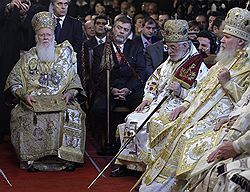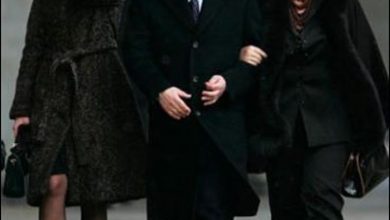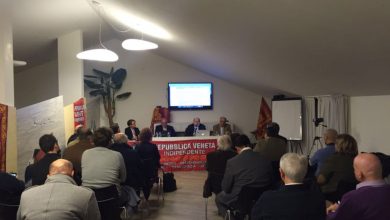ROC slammed the door to Europe
The Russian Orthodox Church announced the withdrawal from the membership of a reputable Christian association – the Conference of European Churches. The Russian Orthodox Church’s demarche was caused by the fact that the Estonian Orthodox Church, which is under the jurisdiction of the Moscow Patriarchate, did not receive membership in the CEC. This event was the culmination of a confrontation between the Moscow and Constantinople Patriarchates for influence in the post-Soviet space, where the position of the Russian Orthodox Church is rapidly weakening.
The Moscow Patriarchate withdrew from the European Union because of Estonia
The delegation of the Russian Orthodox Church announced its withdrawal from the Conference of European Churches on October 11 during a meeting of the organization held in Protaros, Cyprus. The reason for this was the position of KEC regarding the Orthodox dioceses in Estonia. On the territory of this country two Orthodox churches are fighting for influence – the Estonian Apostolic Church, supported by the Patriarchate of Constantinople, and the Estonian Orthodox Church, subordinate to the Moscow Patriarchate. In the Russian Orthodox Church, the apostolic church is considered illegal; moreover, she is accused of expanding to the churches of the Moscow Patriarchate with the support of the Estonian authorities and Constantinople.
The Conference of European Churches (CEC) is a community of 126 Orthodox, Protestant and Old Catholic churches in Europe. Organized in 1959, its goal the organization proclaimed the rapprochement of churches in their “pursuit of unity and mutual understanding.” KEC headquarters are located in Geneva, Brussels and Strasbourg.
The conference of European churches in the dispute between the two Estonian churches openly supported the apostolic church: its application for membership in the CEC was satisfied, and the Estonian church of the Moscow Patriarchate was not allowed to participate in the conference. The leadership of KEC explains their position by the fact that the application of the Moscow Patriarchate came later and did not meet the requirements of the organization. However, the Russian Orthodox Church believes otherwise. “We are talking about the bias of the KEC leadership, the unfair and biased consideration of the issue and the engagement. The organization openly sided with one of the parties to the conflict, blocking the rights of the other,” said Archpriest Vsevolod Chaplin, deputy chairman of the Department for External Church Relations of the Moscow Patriarchate.
The leadership of the Russian Orthodox Church is confident that the decision of the CEC was political. “Violating the agreements concluded the day before with the Moscow Patriarchate, the organization acted in the spirit of the Council of Europe, demonstrating a pan-European course towards isolating Russia,” Father Vladimir Vigilyansky, press secretary of the Moscow Patriarchate, told Kommersant. “We are talking about double standards that the West often applies to Russia,” the well-known theologian deacon Andrei Kuraev supported the priest. “It is with deep regret that we have to admit that the KEC is losing its role as a reconciliating and unifying force, increasingly ignoring the voice of churches from countries outside the European Union,” the Moscow Patriarchate believes. “Thus, the conference loses its historical mission – to be a bridge between the East and the West of Europe. “
The diplomatic defeat in Cyprus was not the only one for the Russian Orthodox Church. The Council of Orthodox hierarchs in Istanbul, which ended yesterday, also ended not in favor of the leadership of the Russian Orthodox Church. On the eve of the Russian Orthodox Church, it delivered an ultimatum to the cathedral, threatening that the Russian delegation would not go to Istanbul if the delegation of the Estonian Apostolic Church was invited there. The cathedral ignored the ultimatum, inviting Estonians, but Patriarch Alexy II did not cancel participation in the cathedral, citing the importance of church unity and the status of the event. The only achievement of the Russian Orthodox Church at the cathedral is the fact that only the heads of 14 local churches signed the final declaration of the cathedral. Representatives of the Estonian Apostolic Church did not receive such a right. However, the self-governing Ukrainian, Moldavian and Estonian Orthodox churches of the Moscow Patriarchate did not have this right at the council.
The conflict situation around Estonia exacerbated the struggle of the Moscow and Constantinople Patriarchates for influence in the post-Soviet space. So, in addition to the Estonian issue, the Russian Orthodox Church has another “hot spot” – in Ukraine. At the initiative of President Viktor Yushchenko, the influence of an autonomous church supported by Constantinople is growing in the country. At the same time, despite the fact that the current defeats in the Russian Orthodox Church are explained by the aggravation of relations between Russia and the West, they are more likely to refer to the failures of church diplomacy itself. More recently, the Russian Orthodox Church has proven that its position could go against state foreign policy if the interests of the church are more important. So, on the eve of the meetings of Orthodox hierarchs in Istanbul and Cyprus, the leadership of the Russian Orthodox Church openly supported the Georgian Patriarchate, refusing to meet the Abkhaz and Ossetian Orthodox churches. Recall that their representatives at the height of the Russian-Georgian conflict announced their withdrawal from the Georgian Orthodox Church and the desire to join the Russian Orthodox Church. The Moscow Patriarchate hopes that Georgia will act as an ally in the struggle for spheres of influence in the canonical territories of the Russian Orthodox Church. However, Georgia has not yet been given such an opportunity – the Georgian church left KEC five years ago, and the Georgian Patriarch Ilia II did not come to Istanbul.
The Supreme Court of Justice of Israel recognized the decision of the Israeli government to transfer the Sergius Compound to the Russian Federation legal. The court found that “the government, in making this transaction, acted in full accordance with its authority.” Recall that last week the government supported Prime Minister Ehud Olmert, who agreed with Russia to transfer to her the Sergievsky Compound, a two-story building of the 19th century in the center of Jerusalem. However, the public organization Legal Forum “For the Land of Israel”, which actively filed a lawsuit with the Supreme Court demanding that the government’s actions be unlawful, is actively opposing this deal. “The government violated Israeli law. Firstly, because at the moment the government has transitional status, which means it can only consider current cases. Secondly, the government did not have the right to make any decisions, since the case of transferring the compound is on considered in the Supreme Court, which has not yet reached its verdict, “lawyer Ariel Bulstein told Kommersant. “The court, after hearing the arguments of government representatives behind closed doors, insistently recommended that we withdraw the lawsuit,” one of the plaintiffs, lawyer Yitzhak Bam, told Kommersant. “In order for the court to not legitimize the government’s actions to transfer the compound, we recalled the lawsuit.” According to the opponents of the transfer of the compound, they admit that they lost the case. The Israeli Foreign Ministry told Kommersant that “if no further lawsuit is followed, then in the near future the process of transferring the Russian farmstead will enter the final phase.”
This post is also available in:
 English
English  Русский (Russian)
Русский (Russian)






